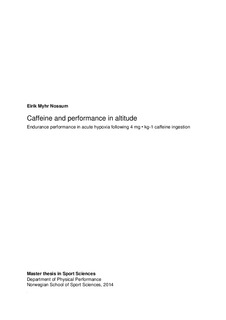Caffeine and performance in altitude: endurance performance in acute hypoxia following 4 mg·kg-1 caffeine ingestion
Master thesis
Permanent lenke
http://hdl.handle.net/11250/220215Utgivelsesdato
2014Metadata
Vis full innførselSamlinger
Sammendrag
Introduction: Various studies have observed improved endurance performance (EP)
following caffeine ingestion (CAF) at lowland. However, the effects CAF have on an
endurance performance in altitude have so far been given little scientific interest. This
master thesis was therefore designed to study the effects of CAF on an 8 km crosscountry
poling performance test (8 km C-PT) during acute exposure to altitude (2000
meters above sea-level). Physiological measurements during a submaximal incremental
test prior to the 8 km C-PT were conducted to understand possible mechanisms behind
an eventually improved performance.
Method: The study had a randomized, double-blinded, cross-over design. 9 highly
trained cross-country skiers fulfilled the inclusion criteria’s. All test subjects underwent
familiarization training prior to the main tests on a cross-country poling ergometer (CCPOL).
One 8 km C-PT was performed in lowland and two 8 km C-PT was conducted in
altitude. Half of the TS were given CAF (4 mg • kg-1) the first 8 km C-PT in altitude
and the other half received placebo (PLA). Logically TS were given opposite treatment
on the second and last 8 km C-PT. Before each 8 km C-PT TS performed a submaximal
incremental test of four 5-minute workloads. Exercise intensity was 55-70 % of the
individual VO2max-altitude.
Results: Results show a small but possible enhancing effect on the time to complete the
8 km C-PT following caffeine ingestion compared to placebo. Average time used in
altitude was 32.36 ± 2.24 minutes after caffeine ingestions and 32.78 ± 2.45 after
placebo. The enhanced performance was mainly due to a higher velocity the first 3 km
of the test. Time used on the 8 km C-PT at lowland was 30.99 ± 3.32 minutes. Lactate
concentrations were significantly increased both during the incremental test and after
the 8 km C-PT in altitude following caffeine ingestion. Heart rate was significantly
increased and blood bicarbonate significantly decreased following caffeine ingestions
during the 8 km C-PT. In addition, no difference in muscular pain was observed during
the performance-test, but subject reported lower perception of pain in the arms after
three of the four submaximal workloads.
Conclusion:
Caffeine ingestion showed a possible enhancing effect on time to complete the 8 km CPT.
The increased HR seen during the 8 km C-PT would indicate that TS was able to
work harder following caffeine ingestion compared to placebo. Although no differences
in RPE was reported one might imagine caffeine, due to the increased workload,
actually lowers RPE.
Beskrivelse
Masteroppgave - Norges idrettshøgskole, 2014
